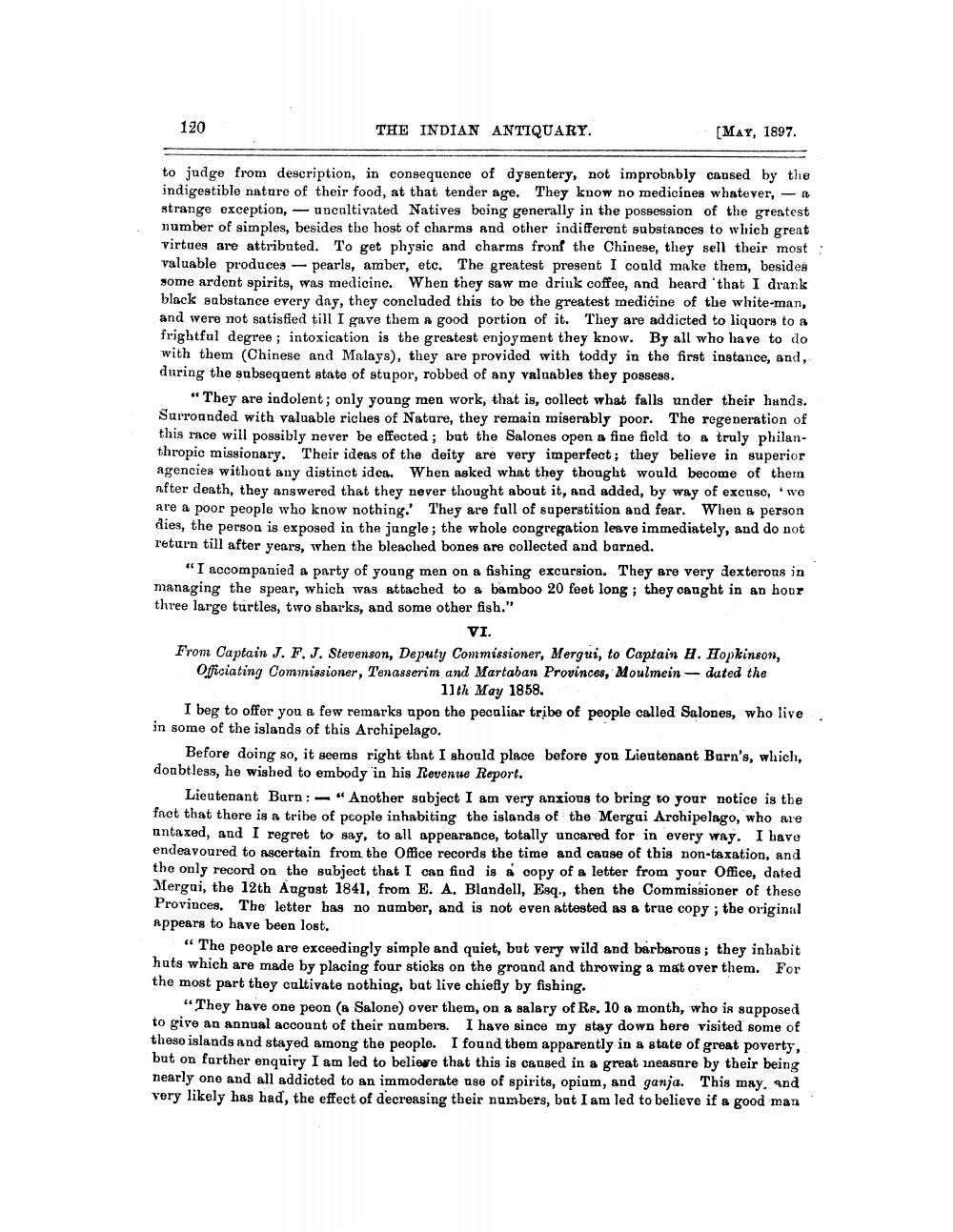________________
120
THE INDIAN ANTIQUARY.
[MAY, 1897.
to judge from description, in consequence of dysentery, not improbably caused by the indigestible nature of their food, at that tender age. They know no medicines whatever, -a strange exception, uncultivated Natives being generally in the possession of the greatest number of simples, besides the host of charms and other indifferent substances to which great virtues are attributed. To get physic and charms from the Chinese, they sell their most: valuable produces pearls, amber, etc. The greatest present I could make them, besides some ardent spirits, was medicine. When they saw me drink coffee, and heard that I drank black substance every day, they concluded this to be the greatest medicine of the white-man, and were not satisfied till I gave them a good portion of it. They are addicted to liquors to a frightful degree; intoxication is the greatest enjoyment they know. By all who have to do with them (Chinese and Malays), they are provided with toddy in the first instance, and, during the subsequent state of stupor, robbed of any valuables they possess.
"They are indolent; only young men work, that is, collect what falls under their hands. Surrounded with valuable riches of Nature, they remain miserably poor. The regeneration of this race will possibly never be effected; but the Salones open a fine field to a truly philanthropic missionary. Their ideas of the deity are very imperfect; they believe in superior agencies without any distinct idea. When asked what they thought would become of them after death, they answered that they never thought about it, and added, by way of excuse, 'wo are a poor people who know nothing.' They are full of superstition and fear. When a person dies, the person is exposed in the jungle; the whole congregation leave immediately, and do not return till after years, when the bleached bones are collected and burned.
"I accompanied a party of young men on a fishing excursion. They are very dexterous in managing the spear, which was attached to a bamboo 20 feet long; they caught in an hour three large turtles, two sharks, and some other fish."
VI.
From Captain J. F. J. Stevenson, Deputy Commissioner, Mergui, to Captain H. Hopkinson, Officiating Commissioner, Tenasserim and Martaban Provinces, Moulmein- dated the 11th May 1858.
I beg to offer you a few remarks upon the peculiar tribe of people called Salones, who live in some of the islands of this Archipelago.
Before doing so, it seems right that I should place before you Lieutenant Burn's, which, doubtless, he wished to embody in his Revenue Report.
Lieutenant Burn: "Another subject I am very anxious to bring to your notice is the fact that there is a tribe of people inhabiting the islands of the Mergui Archipelago, who are untaxed, and I regret to say, to all appearance, totally uncared for in every way. I have endeavoured to ascertain from the Office records the time and cause of this non-taxation, and the only record on the subject that I can find is a copy of a letter from your Office, dated Mergui, the 12th August 1841, from E. A. Blandell, Esq., then the Commissioner of these Provinces. The letter has no number, and is not even attested as a true copy; the original appears to have been lost.
"The people are exceedingly simple and quiet, but very wild and barbarous; they inhabit huts which are made by placing four sticks on the ground and throwing a mat over them. For the most part they cultivate nothing, but live chiefly by fishing.
"They have one peon (a Salone) over them, on a salary of Rs. 10 a month, who is supposed to give an annual account of their numbers. I have since my stay down here visited some of these islands and stayed among the people. I found them apparently in a state of great poverty, but on further enquiry I am led to believe that this is caused in a great ineasure by their being nearly one and all addicted to an immoderate use of spirits, opium, and ganja. This may. and very likely has had, the effect of decreasing their numbers, but I am led to believe if a good man




